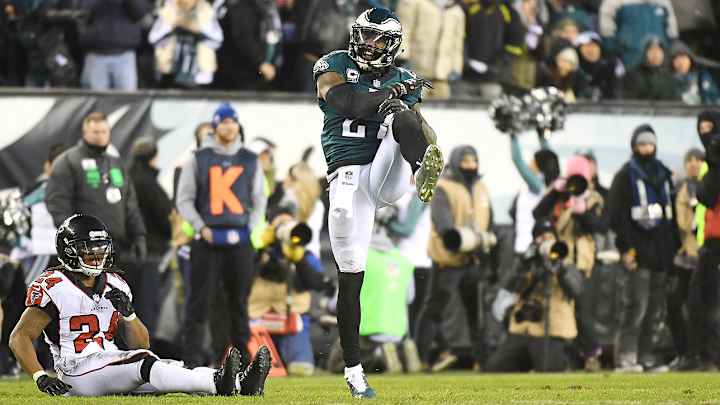Malcolm Jenkins at the Center of the Eagles’ Powerful Defense

PHILADELPHIA — Eagles defensive coordinator Jim Schwartz rewards film study by affording his players the opportunity to gamble.
During a game, when they see something they’ve recognized on film, the Eagles defense resembled the trading room floor on Wall Street. The group ignites; hand signals, shoulder taps and flailing arms lead to shifts and swaps. Linebacker Nigel Bradham said the most gratifying part of the process are the facial expressions offensive players sometimes make when they realize the play is doomed before the snap.
This occurred most notably on the Falcons’ final play of Saturday’s divisional playoff game. Atlanta had run the same look about two or three times in similar situations, he said.
“It’s like, [the offense] better make a decision quick,” Bradham said. “Because the play is going to be over pretty soon and you’re either gonna get sacked, tackled for loss… something. You just see their face. You don’t know what they’re thinking but obviously they aren’t checking out of it.”
Amid all this chaos, there is no one Schwartz relies on more to organize the mania than safety Malcolm Jenkins. Those watching the Eagles every weekend know he’s often a preview of what’s to come. With startling accuracy, a viewer can follow him from snap to ball and almost never miss the meat of a play. On a field full of defenders playing the odds and crashing toward the ball, his ability to sift through a minefield of blockers and end up at the bottom of a pile somehow stands out. He is, quite possibly, the most important player remaining on the Eagles’ roster since Carson Wentz went down with a torn anterior cruciate ligament back in December and will be integral to another upset bid this weekend at home against the Vikings.
Playoff Play Calls Gone Wrong: If Coaches Could Do It Differently
In an effort to better understand Jenkins the football player—he is often better known as one of the team’s affable captains and a face for the players’ push for social justice reform—watch their stunning upset of the Falcons a week ago. Atlanta had 59 offensive snaps and on at least 10 of them, Jenkins seemed to know the play before the ball was snapped. There is a significant difference between a player who just reacts quickly and someone who shuffles over to the other side of the defense, pushes another player out of his way and watches as the running back comes straight into his gap for a head-on collision.
“Smart player, man,” Chris Long said. “Smart player. Jim does a great job and with Malcolm doing all the film study he does and all the experience he has, that’s not surprising.”
Throughout the game he shuffled between responsibilities as a slot cornerback, deep safety and linebacker. He had to, at times, mark tight ends, running backs and each of the Falcons’ top two wide receivers. On Atlanta’s last-gasp fourth-and-one, Jenkins was in the slot guarding Mohamed Sanu. As the play broke to the right side, Julio Jones slipped and Sanu was the only other receiver breaking right in the area.
From quarterback Matt Ryan’s point of view, Jenkins was standing right in front of him and the only other logical place to throw the ball.
“If Malcolm doesn’t get that route that he covered, if he doesn’t get that covered, nobody’s talking about Jalen Mills [the cornerback who guarded Jones] right now,” Schwartz told reporters. “I just think a part of our success is our guys just understand what’s asked of them in the schemes. They communicate well. We don’t make a lot of mistakes, mental mistakes, and I think that makes it hard to drive the ball on us.”
At a time where so many defensive players are becoming specialized and situational, Jenkins on Saturday blew up lead-blocking offensive linemen and sat in deep centerfield, dictating some of Ryan’s most critical deep throws by playing chicken until the last possible second. He lined up as a standard outside linebacker helping create simulated pressures and expertly baited opposing wideouts into thinking he was in tight press coverage before fading into zone.
The notion that the Eagles are somehow an underdog during the playoffs comes from the dependable cliché that a team cannot win without their hyper-talented starting quarterback. But what if a team has all of those qualities—perhaps more—in their defensive anchor?

Conor Orr is a senior writer for Sports Illustrated, where he covers the NFL and cohosts the MMQB Podcast. Orr has been covering the NFL for more than a decade and is a member of the Pro Football Writers of America. His work has been published in The Best American Sports Writing book series and he previously worked for The Newark Star-Ledger and NFL Media. Orr is an avid runner and youth sports coach who lives in New Jersey with his wife, two children and a loving terrier named Ernie.
Follow ConorOrr